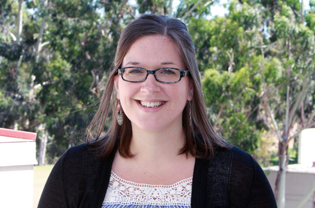Beyond the prison walls

Beyond the prison walls
- September 3, 2013
- UCI sociology professor studies how incarceration affects U.S. families
-----
 As the incarceration rate in America continues to climb, researchers are studying
just how wide its effects spill beyond the prison walls. Kristin Turney, UCI sociology
assistant professor, is looking at two residual outcomes impacting the families of
those behind bars: education and food insecurity.
As the incarceration rate in America continues to climb, researchers are studying
just how wide its effects spill beyond the prison walls. Kristin Turney, UCI sociology
assistant professor, is looking at two residual outcomes impacting the families of
those behind bars: education and food insecurity.
“When mom or dad goes to prison, the whole family suffers,” she says. “A father’s incarceration, for example, makes maintaining relationships with the child’s mother difficult. It also means the family loses the father’s income and increases family expenses because of costly travel for visits and collect phone calls.”
Turney is interested in knowing how incarceration, and its spillover effects on family life, impacts educational outcomes for children and availability of food for families.
In the last three months, she has received close to $150,000 in grants from the National Academy of Education, the American Educational Research Association and the University of Kentucky Center for Poverty Research to study these impacts.
To do so, she is using the Fragile Families and Child Wellbeing Study, a longitudinal study that has collected data on the same families, many of whom are economically disadvantaged, over a 10-year span since 1998.
“Over the course of the survey, almost half of the dads have spent time in prison,” she says, noting an unintended finding from the survey. “Since we can account for families in which a parent has been incarcerated, we can study whether or not incarceration is associated with food availability or education.”
Preliminary findings suggest there is a negative causal association; incarceration of a parent leads to behavioral problems and lower test scores, and children of an incarcerated parent are more likely to have reported missing a meal.
But she’s also found that incarceration isn’t always a negative and it may not always be to blame.
“These are some of the most interesting findings,” she says. “I’m finding that incarceration isn’t a uniformly bad thing for families and children."
In terms of children’s educational outcomes, preliminary results show that the effects of incarceration are worse for the children of fathers who are least likely to be incarcerated - those who are involved dads and solid economic providers. But for children of very disadvantaged fathers, it appears that incarceration may actually benefit the child or, at the very least, have no effect on their educational outcomes.
She’s also finding that, in some cases, disadvantaged socioeconomic status is just as detrimental as a prison sentence to food insecurity and education.
While the findings are still preliminary, Turney says they have implications for policy makers.
“If incarceration is causing inequalities for children, then we can look toward criminal justice policy changes for solutions – potentially through sentencing reductions or programs that help the families of those incarcerated. But if the problem is more widespread, regardless of familial incarceration status, then policy changes may need to be more broad and deployed on a larger scale to help disadvantaged families.”
Funding from the Center for Poverty Research and National Academy of Education runs
through 2014; the American Educational Research Association award will fund Turney’s
research through 2015.
-----
Would you like to get more involved with the social sciences? Email us at communications@socsci.uci.edu to connect.
Share on:
Related News Items
- Careet RightLopez-Rodriguez awarded Educational Enhancement Scholarship
- Careet RightGood Authority's top 10 posts of 2025
- Careet RightFabric of Pittsburgh: The Terrible Towel went from 'gimmick' to changing two generations of fandom
- Careet RightSoCal business owner says Meta's AI security system incorrectly banned her store's Instagram account
- Careet RightPeng Peiyun, 95, dies; official renounced China's one-child policy


